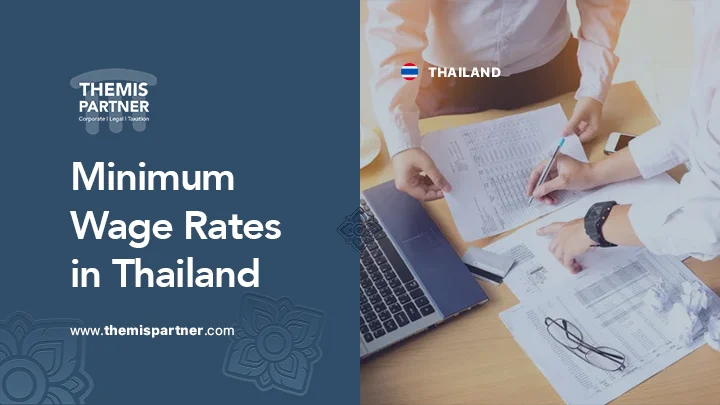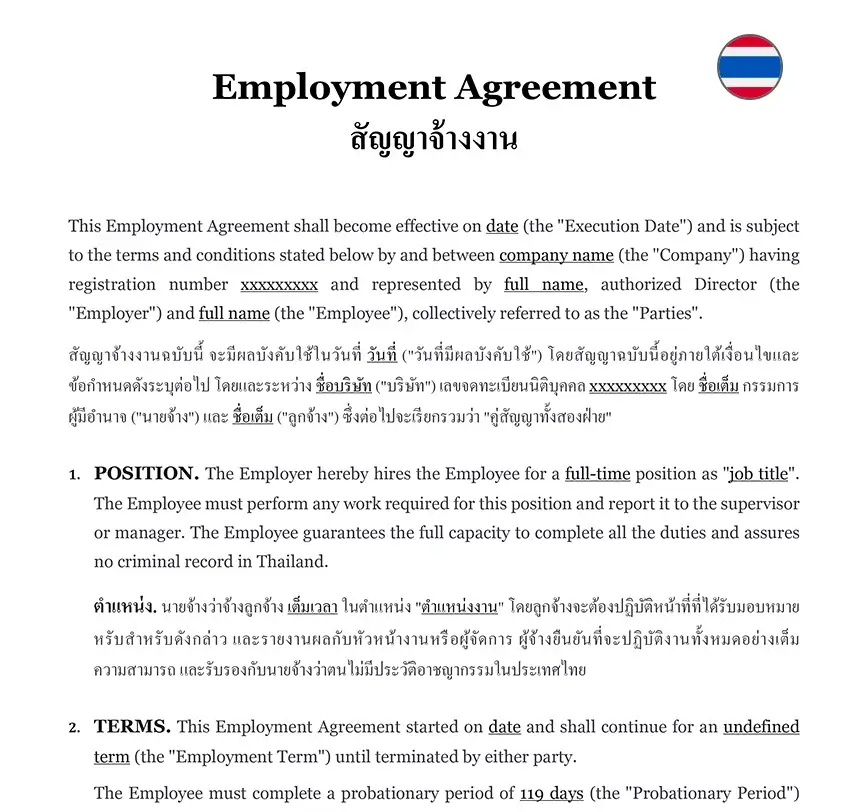From July 1, 2025, new minimum wage rates Thailand have set Bangkok’s daily minimum at 400 baht, while hospitality sectors nationwide must match this rate regardless of location.
These changes mark the highest adjustments in recent years, responding directly to rising living costs and tightening compliance regulations.

For business owners, professionals, and HR managers, knowing the latest wage tables is critical: each sector and province now faces updated payroll requirements, with the highest applicable rate always taking priority. Delays or errors can result in significant fines and reputational risk.
Key Takeaways
-
Thailand’s 2025 minimum wage takes effect 1 January, ranging 337-400 baht daily by province and sector.
-
Bangkok and Category 2-4 hotels/entertainment venues must pay 400 baht from 1 July.
-
Employers must update payroll and overtime systems to match new rates.
-
Applies equally to Thai and foreign workers with valid work permits.
-
Maintain wage slips, pay records, and contracts to avoid fines up to 400,000 baht per violation.
-
Tourism hubs like Phuket, Chonburi, and Koh Samui lead at 400 baht; southern provinces remain lowest.
-
Hospitality and tourism sectors face the biggest impact but benefit from stronger job retention and spending.
-
Authorities will inspect and audit payrolls to enforce compliance in 2025.
Looking to outsource HR & payroll?
Our team handle payroll, HR administration, PEO employment, and full visa and relocation support.
Table of Contents
-
What Are the New Minimum Wage Rates in Thailand?
-
How Do Regional Wages Affect Workers and Businesses?
-
What Are the Foreign Worker Minimum Wages in 2025?
-
What Must Employers Do to Comply with Regulations?
-
How Do Wage Increases Impact Thai Workers and Businesses?
-
FAQ: Thailand Minimum Wage Rates 2025
-
Conclusion
What Are the New Minimum Wage Rates in Thailand?
How Have Minimum Wage Changed for 2025?
Thailand’s new minimum wage rates apply from January 1, 2025, rising across all provinces to 337-400 baht per day. On July 1, 2025, Bangkok’s rate increased to 400 baht/day for every business, and nationwide, all Category 2-4 hotels and entertainment venues are subject to the same 400 baht daily minimum.
Key factors driving these changes include:
- Elevated living costs
- Regional economic differences
- Government policy to support both workers and long-term business resilience
Compared to 2024, the minimum now rises from a 330-370 baht range, reflecting a targeted response to national inflation and cost-of-living pressures.
Employers must use the updated wage rates for all payroll calculations from the effective dates forward.
Thailand’s Minimum Wages by Location & Sector
The 400 baht/day minimum overrides local rates in Bangkok and for specified sectors nationwide:
- Category 2-4 hotels (excluding very small hotels)
- Entertainment venues serving food or drinks
| Location or Sector | Minimum Wage (Baht) |
|---|---|
| Bangkok (all businesses) | 400 |
| Chonburi, Phuket, Rayong, Koh Samui | 400 |
| Category 2–4 hotels & entertainment (all) | 400 |
| Chiang Mai, Hat Yai | 380 |
| Nakhon Pathom, Nonthaburi, Pathum Thani | 372 |
| Other provinces/districts | 337-372 |
If a business fits multiple categories, the highest applicable rate always takes priority. For further reference, review Department of Labour Protection and Welfare listings.
How Do Regional Wages Affect Workers and Businesses?
Why Do Minimum Wage Rates Vary Across Thailand?
Minimum wage rates in Thailand differ by province due to distinct economic and social factors. Rates are set higher where costs of living, business activity, and workforce demand are greatest.
Key regional influences include:
- Local cost of living (housing, food, transportation)
- Primary industries and major employers
- Economic priorities and development goals
For example, Chonburi and Phuket have higher minimum wage rates thanks to strong tourism and higher living costs, while southern border provinces such as Narathiwat have lower rates reflecting local market conditions.
A color-coded map from the Department of Labour Protection and Welfare highlights these differences visually.
Which Sectors and Locations Have the Highest and Lowest Wages?
As of July 1, 2025, these groups see the highest minimum daily wage at 400 baht:
- All workers in Bangkok, Chachoengsao, Chonburi, Phuket, Rayong, and Koh Samui
- Nationwide: Employees of hotels (Category 2-4) and entertainment venues
Other areas range from 337-380 baht per day, with the lowest rates in provinces like Narathiwat, Pattani and Yala.
Regional wage variation directly impacts payroll, competitiveness and the cost of doing business, making local compliance essential for employers.
What Are the Foreign Worker Minimum Wages in 2025?
Foreign and Thai Workers Minimum Wage Requirements
Thailand’s 2025 new minimum wage rates apply equally to foreign and Thai workers, regardless of nationality. All legal employees (local and foreign) must receive at least the wage set for their province or sector.
For foreign laborers, employers must also:
- Ensure full legal registration with the Department of Employment
- Verify valid work permits and sector assignments
- Apply the same minimum wage standards that apply to Thai employees, including the 400 baht/day rate for designated sectors
A foreign worker’s documentation must always be complete, current, and aligned with their job description. This helps businesses pass compliance checks and avoid legal risks.
How Can Employers of Foreign Workers Stay Compliant?
Employers should review all foreign staff records and payroll regularly. To stay compliant with the 2025 update:
- Check that every foreign employee earns at least the new minimum wage for their role and location
- Renew work permits and verify registration details before employment begins
- Keep digital and paper records, including Payslips and Employment Contracts, for audits
Non-compliance penalties can include:
- Fines of up to 400,000 baht per illegal worker
- Deportation of non-registered employees
What Must Employers Do to Comply with Regulations?
Update Payroll and Record-Keeping for 2025 rates
Employers must update payroll systems immediately to reflect Thailand’s new minimum wage rates from both January 1 and July 1, 2025.
To stay compliant, follow these steps:
- Check the updated minimum wage for each province or sector your employees work in.
- Adjust wage rates in payroll software for regular and overtime pay.
- Segment payroll if your team includes staff in newly affected hotels or entertainment venues at the nationwide 400 baht rate.
Maintain proper records by:
- Issuing updated wage slips that reflect the new daily minimums.
- Retaining comprehensive audit trails for all wage adjustments.
- Using digital checks to ensure new rates apply across all business units.
For a deeper understanding of employer responsibilities under Thai law, read our Thailand labour law regulations and rights guide.
What Are the Risks of Non-Compliance?
Thailand enforces minimum wage compliance through regular:
- On-site inspections and reviews of wage records
- Random audits of businesses in high-risk sectors
- Investigations following complaints filed by workers
Non-compliance may lead to:
- Fines under the Labour Protection Act for unpaid wages
- Orders to pay wage arrears
- Possible court or Labour Court actions
Disputes can be reported directly to the Labour Court of Thailand or via the ILO Thailand office.
How Do Wage Increases Impact Thai Workers and Businesses?
What Are the Economic and Social Effects of Wage Increases?
Minimum wage increases in Thailand for 2025 directly affect payroll costs, product pricing, and household incomes. Tourism, manufacturing, and services are most impacted, as many workers in these sectors now receive a 400 baht daily minimum.
Key impacts include:
- Improved purchasing power for an estimated 700,000 workers, especially in Bangkok and the tourism sector
- Potential for increased consumer spending within local economies
- Businesses face higher operating costs, requiring strategic payroll review and potential price adjustments
Government sources expect better job retention and lower staff turnover, though some smaller operations cite margin pressures.
Are There Case Studies on How Minimum Wage Changes Affect Different Industries?
Large hotels in Phuket and Chonburi report improved staff satisfaction but tighter profit margins after wage enforcement.
Urban retailers in Bangkok adapt by streamlining shift coverage, while smaller rural businesses may reduce hours or trim roles.
- Manufacturing: Increased wages offset by higher productivity goals
- Hospitality: Higher wages boost retention, particularly in tourist hubs
- Retail: Larger chains adapt via automation, small operators may adjust staffing
For comparative industry data and economic analysis, see World Bank Thailand wage reports.
FAQ: Thailand Minimum Wage Rates 2025
Below are answers addressing the most urgent queries for employers and workers under the new minimum wage rates in Thailand.
Is overtime pay affected by the new rates?
Yes. Overtime calculations must use the updated minimum daily wage as of January or July 2025 if applicable in your sector or province. Example: Bangkok-based employees (all businesses) require overtime pay calculated from 400 baht per day starting July 1, 2025.
How are part-time/temporary worker wages adjusted?
All wage earners, including those paid hourly or by shift, must receive at least the daily minimum rate, calculated proportionally. For example, a half-day shift in Phuket should reflect at least 200 baht, since the daily minimum is 400 baht.
Are further minimum wage adjustments planned after 2025?
Wage reviews occur annually. The Ministry of Labour typically announces any adjustments by late Q3 each year. Stay updated at mol.go.th.
How do workers or employers report wage disputes?
Issues can be submitted to the Department of Labour Protection and Welfare via their hotline (1506), local labour offices, or online complaint form. Documentation of wage slips and contracts supports your case.
Conclusion
Review your payroll systems today. Update wage rates, segment by sector and province, and keep clear, auditable records. Confirm every worker earns the new minimum, regardless of role or nationality. Prompt, proactive change eliminates risk and builds trust.
For tailored compliance strategies and ongoing updates, contact us. Themis Partner streamlines payroll transitions, clarify new labour rules and empower you to operate confidently under Thailand’s evolving regulation.


